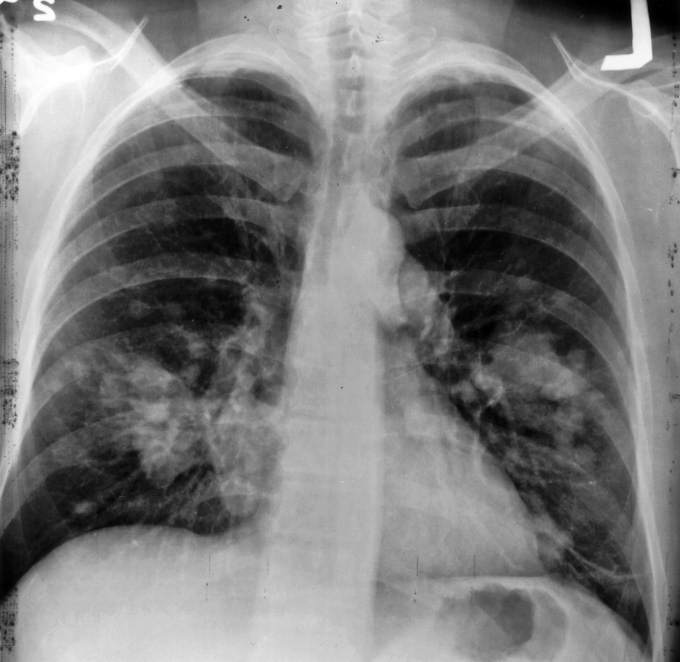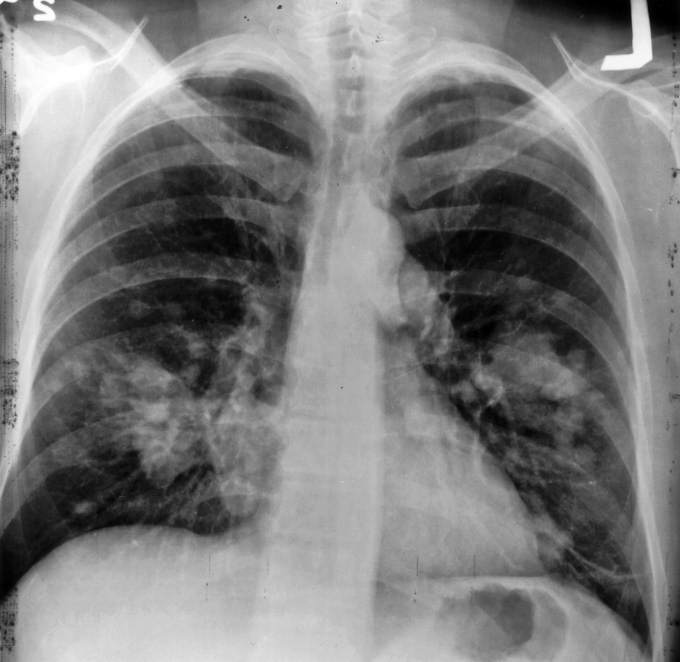
PATIENTS with non-small cell lung cancer which has spread to the brain could be spared whole brain radiotherapy as it makes little or no difference to how long they survive and their quality of life, according to a Cancer Research UK-funded clinical trial published today (Sunday) in The Lancet*.
Around 45,500 people are diagnosed with lung cancer in the UK every year and an estimated 85 per cent of cases are non-small cell lung cancer. Up to 30 per cent of patients with non-small cell lung cancer have the disease spread to the brain.
Typically these patients are given steroids and supportive care, such as painkillers, to control their cancer symptoms, but may also be offered whole brain radiotherapy daily for one to two weeks to improve symptoms. Before this trial, doctors had little evidence to prove whether giving these patients whole brain radiotherapy benefitted them.
Because whole brain radiotherapy can cause side effects** and involves daily visits to the hospital, the QUARTZ trial*** looked at whether it improves how long patients survived for and its effect on quality of life.
The trial, led by researchers from the MRC Clinical Trials Unit at UCL, studied 538 patients from the UK and Australia. Half of the patients had whole brain radiotherapy and the other half did not, all the patients received steroids and supportive care.
The trial found no clear difference in survival and quality of life between the patients who did and didn’t receive whole brain radiotherapy.
The patients who had whole brain radiotherapy lived for around five days longer (9.2 weeks after entering the trial compared with 8.5 weeks for those who didn’t receive radiotherapy), and reported around five more days of good quality life****. These small differences could be down to chance and suggest that whole brain radiotherapy doesn’t increase survival or quality of life. This means that patients could be spared the extra radiotherapy treatment.
While research has doubled cancer survival rates, progress has not been the same across all cancer types and survival remains low for people with lung cancer. To help tackle this Cancer Research UK increased investment in this cancer in its research strategy in 2014.
Dr Paula Mulvenna, the clinical chief investigator from the Northern Centre for Cancer Care in Newcastle, said: “This trial is changing treatment for patients. Before the QUARTZ trial clinicians weren’t certain that giving whole brain radiotherapy enhanced our patients’ quality of life, but did frequently offer it in good faith. These results confirm we can safely omit this treatment and concentrate on other ways of ensuring our patients and their families receive the best end of life care.”
Professor Ruth Langley, from the MRC Clinical Trials Unit at UCL, said: “We’re extremely grateful to the patients, carers and clinicians who took part in this challenging trial and helped us identify this important information that could improve the final days for many patients around the world.”
Martin Ledwick, Cancer Research UK’s head information nurse, said: “These trial results could help patients with limited time choose how they spend the end of their lives. For many people spending time at home with family and friends is their priority so knowing that they can do this rather than going backwards and forwards to hospital could be their preference.”
###
For more information about the trial call 0808 800 4040 to speak to Cancer Research UK’s information nurses or visit http://www.cancerhelp.org.uk
For media enquiries contact Emily Head in the Cancer Research UK press office on 020 3469 6189 or, out of hours, on 07050 264 059.
Notes to editor:
* Mulvenna et al. Can whole brain radiotherapy be omitted from the treatment of non small cell lung cancer patients with brain metastases not amenable to stereotactic radiotherapy or surgery? Results from the UK Medical Research Council QUARTZ randomised clinical trial. The Lancet. 2016.
** These include hair loss, headache, tiredness, nausea, clumsiness, a dry or itchy scalp and poor concentration.
*** More information available here: http://www.cancerresearchuk.org/about-cancer/find-a-clinical-trial/a-trial-looking-at-the-treatment-of-lung-cancer-which-has-spread-to-the-brain
**** The trial measured quality adjusted life years (QALYs) which takes into account both length of survival and quality of life during that time. On average, those who had steroids, supportive care and whole brain radiotherapy had 46.4 days of good quality of life, and those who had steroids and supportive care 41.7 days of good quality life, a difference of 4.7 days.
About the MRC Clinical Trials Unit at UCL
The MRC Clinical Trials Unit at UCL is at the forefront of resolving internationally important questions in infectious diseases and cancer, and delivering swifter and more effective translation of scientific research into patient benefits. It does this by carrying out challenging and innovative studies, and developing and implementing methodological advances. It is part of the Institute of Clinical Trials and Methodology at UCL, and is funded by the Medical Research Council.
About Cancer Research UK
- Cancer Research UK is the world’s leading cancer charity dedicated to saving lives through research.
- Cancer Research UK’s pioneering work into the prevention, diagnosis and treatment of cancer has helped save millions of lives.
- Cancer Research UK receives no government funding for its life-saving research. Every step it makes towards beating cancer relies on every pound donated.
- Cancer Research UK has been at the heart of the progress that has already seen survival in the UK double in the last forty years.
- Today, 2 in 4 people survive their cancer for at least 10 years. Cancer Research UK’s ambition is to accelerate progress so that by 2034, 3 in 4 people will survive their cancer for at least 10 years.
- Cancer Research UK supports research into all aspects of cancer through the work of over 4,000 scientists, doctors and nurses.
- Together with its partners and supporters, Cancer Research UK’s vision is to bring forward the day when all cancers are cured.
For further information about Cancer Research UK’s work or to find out how to support the charity, please call 0300 123 1022 or visit http://www.cancerresearchuk.org. Follow us on Twitter and Facebook.
Media Contact
Emily Head
[email protected]
020-346-96189
@CR_UK
http://www.cancerresearchuk.org
The post Lung cancer patients whose tumor has spread to the brain could be spared radiotherapy appeared first on Scienmag.





